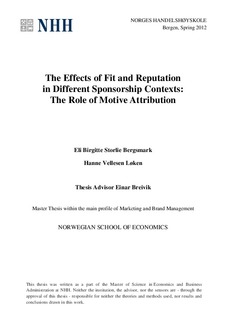The effects of fit and reputation in different sponsorship contexts : the role of motive attribution
Master thesis
Permanent lenke
http://hdl.handle.net/11250/169749Utgivelsesdato
2012Metadata
Vis full innførselSamlinger
- Master Thesis [4372]
Sammendrag
Sponsorship is one of the fastest growing forms of marketing communication. Despite the popularity, sponsorships are a relatively unexplored discipline in academia compared to related marketing areas. This thesis investigates the role of fit and company reputation as well as how motive attribution can act as a mediator in sponsorship contexts. We also examine if there is a difference in the degree to which these constructs will impact consumer outcomes in sports versus socio sponsorships. Five hypotheses were explored by conducting an experiment using an online-based questionnaire. Our findings indicated a direct effect of fit and reputation on company image and consumers’ sponsorship attitude. However, perceived fit did not play a crucial role. Altruistic motive attribution on sponsorship attitude proved significant for fit and reputation in general. Socio sponsorships resulted in a more favorable sponsorship attitude. In addition, the effect of reputation on sponsorship attitude was mediated by attributed altruistic motive for socio sponsorships. The results are of interest theoretically, as the two sponsorship objects are often studied separately, and for managers who need guidance in choosing the right sponsorship object. More specifically, a company with a good reputation that wants to be perceived as an altruistic company should sponsor a charitable organization rather than a sports organization.
